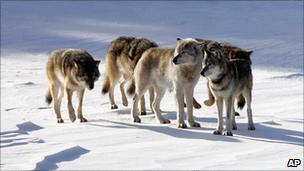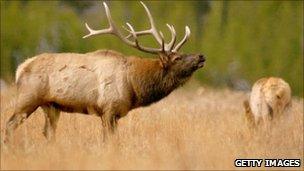Congress strips grey wolf endangered species protection
- Published

Conservation groups fear the move by Congress could set a dangerous precedent
Politicians in the US Congress have for the first time removed a previously threatened animal from the nation's endangered species list. The move is the culmination of a long dispute that has pitted the wolves' defenders against hunters who said the animals were devastating wild game they wanted for themselves.
At the stroke of a pen, US President Barack Obama on Friday stepped into a bloody fight between two American populations with clout in Washington and a loud voice in the news media - wolves and elk.
Tucked into a budget bill Mr Obama signed on Friday is a provision to remove grey wolves in a wide swath of the American West from the US endangered species list.
The move, sponsored by a bipartisan group of senators from rural western states and one of several policy measures grafted on to the budget, will eventually allow affected states to manage the size of wolf packs and, hunters say, help restore elk herds they say have been ravaged by hungry wolves.
But wildlife conservation groups fear it could set a precedent for political interference in a process that has previously been left to biologists.
The law removes federal protection from grey wolves in Montana, Idaho and parts of three other states. Montana and Idaho have already planned wolf hunts, and the wolves' champions fear the worst.
"We may soon be witnessing the second large-scale extermination of wolves in the West," said Suzanne Stone of Defenders of Wildlife, which has fought vigorously to maintain the wolves' federal protection.
Hunters' groups and state wildlife officials say the wolves have wrought havoc on herds of elk and other wildlife, and killed livestock and even pets.
They say wolf populations have met target recovery goals, and say states need more flexibility to manage the packs through controlled hunts.
"Unmanaged wolves have destroyed jobs, rural economies, and the opportunity for people to put food on their plate," said Don Peay, founder of Sportsmen for Fish and Wildlife, a group of conservation-minded hunters.
Once abundant in the US, grey wolves were virtually wiped out in the 19th and early 20th Centuries. To prevent the wolves from killing livestock as ranchers moved into vast stretches of plain, the US government backed an extensive effort to kill the wolves, with traditional hunting and even poison. By the 1930s they were mostly gone.
In 1973, President Richard Nixon signed the Endangered Species Act, which aimed to prevent the extinction of imperilled animal species and to aid their recovery.
The grey wolf was added to the list the following year, granting it significant protection from private hunters and from state and local government agencies.
In 1987, the government embarked on a wolf recovery plan, and later reintroduced Canadian wolves into the west. Since then the packs have thrived, far exceeding the 1987 goals. Last year, biologists estimated, external more than 1,600 wolves lived in the northern Rocky Mountains region, up from just over 400 a decade before.
Anti-elk violence
In 2009, the US Department of the Interior deemed the wolf had recovered and removed it from the endangered species list in the northern Rocky Mountain region, but a series of lawsuits by conservation groups halted the move.

Hunters' groups say wolves have destroyed elk herds
At least 20 species - including the bald eagle and the alligator - have been removed from the endangered species list after recovering to healthy levels, but those decisions were made by the US Fish and Wildlife Service, not by politicians in Congress.
The hunters' groups which have pushed for the end of the grey wolf's protection argue the resurgent wolves have overwhelmed herds of elk, the wolves' prey.
Indeed, wildlife biologists in Yellowstone National Park said in January the elk herd there had dropped 72% since the 1995 wolf restoration.
And in Wyoming, wildlife officials said in 2007 that wolves had contributed "significantly" to the decline in elk populations.
Resurgence
Hunters say wolf management would allow elk and other game to thrive, putting meat on hunters' tables and luring big-spending big-game hunters.
"It's a travesty that the grey wolves totally decimated the elk herds," said Byron Bateman, a Utah hunter. "The wolf has eaten itself out of house and home. It's not the wolf's fault, it's the federal government's."
David Mech, a wildlife biologist who has studied wolf populations for more than five decades, said studies had not conclusively determined wolves had caused widespread decline in western elk herds, as drought and aggressive human hunters had also contributed.
But he said he supported the wolf's removal from the endangered species list, in part because wolves had rebounded.
"The public was led to believe that when the wolves reached those recovery levels they would be delisted and management turned over to the states," he said. "And the public feels very violated."
- Published3 September 2010
- Published7 August 2010